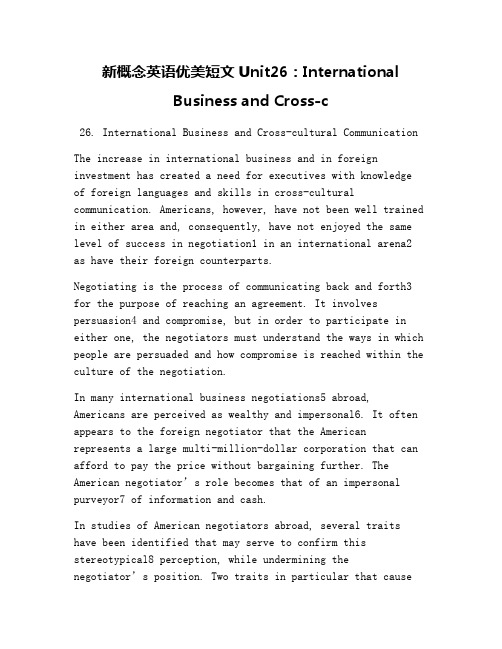外贸箱包皮具档口英语教程unit26
- 格式:pptx
- 大小:568.57 KB
- 文档页数:2





新概念英语优美短文Unit26:InternationalBusiness and Cross-c26. International Business and Cross-cultural CommunicationThe increase in international business and in foreign investment has created a need for executives with knowledge of foreign languages and skills in cross-cultural communication. Americans, however, have not been well trained in either area and, consequently, have not enjoyed the same level of success in negotiation1 in an international arena2 as have their foreign counterparts.Negotiating is the process of communicating back and forth3 for the purpose of reaching an agreement. It involves persuasion4 and compromise, but in order to participate in either one, the negotiators must understand the ways in which people are persuaded and how compromise is reached within the culture of the negotiation.In many international business negotiations5 abroad, Americans are perceived as wealthy and impersonal6. It often appears to the foreign negotiator that the American represents a large multi-million-dollar corporation that can afford to pay the price without bargaining further. The American negotiator’s role becomes that of an impersonal purveyor7 of information and cash.In studies of American negotiators abroad, several traits have been identified that may serve to confirm this stereotypical8 perception, while undermining thenegotiator’s position. Two traits in particular that causecross-cultural misunderstanding are directness andimpatience9 on the part of the American negotiator. Furthermore, American negotiators often insist on realizing short-term goals. Foreign negotiators, on the other hand, may value the relationship established between negotiators andmay be willing to invest time in it for long-term benefits.In order to solidify10 the relationship, they may opt11 for indirect interactions without regard for the time involved in getting to know the other negotiator.国际商业和跨文化交流国际贸易和海外投资的增加产生了对具有外语知识和跨文化交流技巧的经理的需求。
